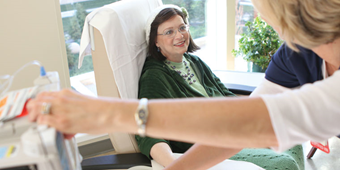More Women Should Consider Genetic Testing For Breast Cancer

Answer a few questions and we'll provide you with a list of primary care providers that best fit your needs.
More women should consider genetic testing for hereditary breast or ovarian cancer, following recently released, expanded guidelines.
Specifically, researchers are focused on the BRCA1 and BRCA2 genes, which can contain mutations that can block the body’s ability to repair damaged DNA. This mutation can also be passed on from one generation to the next, greatly increasing the chances of breast, ovarian, and some other cancers.
Though the link between these mutations and breast cancer is not a new discovery, researchers believe this new testing recommendation could significantly impact patients’ long-term health, as well as that of extended family members.
Premier Health Now spoke with breast surgeon Thomas A. Heck, MD, of Gem City Surgeons to learn more about the new guidelines and their importance for women’s health.
The Power Of Prevention
“The U.S. Preventive Services Task Force has essentially said that anybody who's been diagnosed with breast cancer should be genetically tested, which also agrees with the American Society of Breast Surgeons," says Dr. Heck. “Previously there were other factors that limited whether someone should be tested, such as age or family history, but now that’s all changed.”
Dr. Heck explains that the announcement is significant because increased testing may lead to expanded detection of genetic mutations. This allows doctors to make informed decisions about potentially lifesaving care for patients and their relatives.
“If a patient with breast cancer is found to have a BRCA mutation, their risk of having another breast cancer in their lifetime can go up to 50 percent, and their risk of ovarian cancer is up to about 50 percent,” says Dr. Heck. “If other close relatives are tested and the BRCA mutation is discovered, their lifetime risk of getting breast cancer is up to 80 percent, and their risk for ovarian cancer goes up to 50 percent.”
Such discoveries can help patients consider and take important steps to prevent future cancers. These can include an elective double mastectomy or the removal of fallopian tubes and ovaries. Dr. Heck stresses that any decision of this sort must come under the careful guidance of an expert genetic counselor and a physician.
Answer a few questions and we'll provide you with a list of primary care providers that best fit your needs.
Source: Thomas A. Heck, MD, FACS, Gem City Surgeons; LA Times





